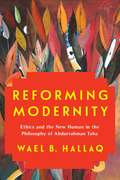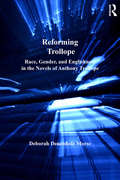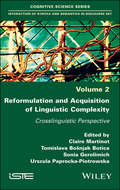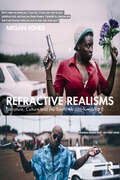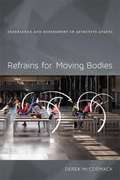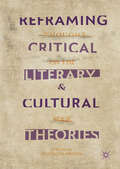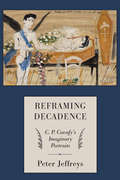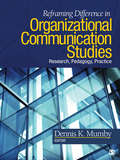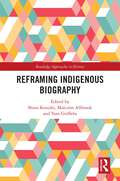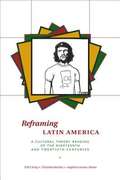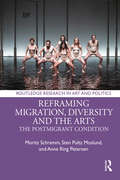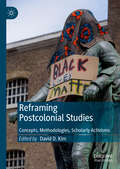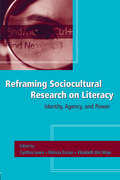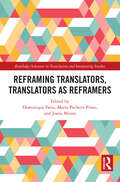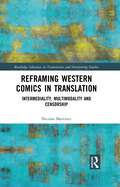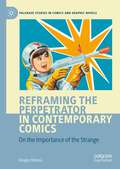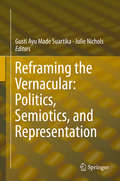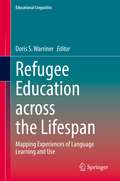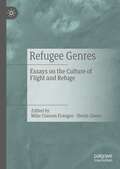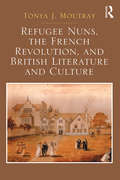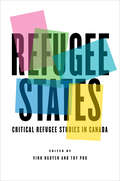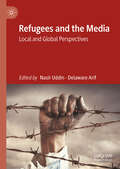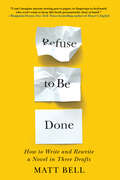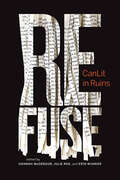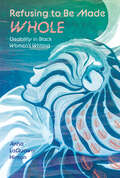- Table View
- List View
Reforming Modernity: Ethics and the New Human in the Philosophy of Abdurrahman Taha
by Wael HallaqReforming Modernity is a sweeping intellectual history and philosophical reflection built around the work of the Morocco-based philosopher Abdurrahman Taha, one of the most significant philosophers in the Islamic world since the colonial era. Wael B. Hallaq contends that Taha is at the forefront of forging a new, non-Western-centric philosophical tradition. He explores how Taha’s philosophical project sheds light on recent intellectual currents in the Islamic world and puts forth a formidable critique of Western and Islamic modernities.Hallaq argues that Taha’s project departs from—but leaves behind—the epistemological grounds in which most modern Muslim intellectuals have anchored their programs. Taha systematically rejects the modes of thought that have dominated the Muslim intellectual scene since the beginning of the twentieth century—nationalism, Marxism, secularism, political Islamism, and liberalism. Instead, he provides alternative ways of thinking, forcefully and virtuosically developing an ethical system with a view toward reforming existing modernities. Hallaq analyzes the ethical thread that runs throughout Taha’s oeuvre, illuminating how Taha weaves it into a discursive engagement with the central questions that plague modernity in both the West and the Muslim world. The first introduction to Taha’s ethical philosophy for Western audiences, Reforming Modernity presents his complex thought in an accessible way while engaging with it critically. Hallaq’s conversation with Taha’s work both proffers a cogent critique of modernity and points toward answers for its endemic and seemingly insoluble problems.
Reforming Trollope: Race, Gender, and Englishness in the Novels of Anthony Trollope
by Deborah Denenholz MorseTrollope the reformer and the reformation of Trollope scholarship in relation to gender, race, and genre are the intertwined subjects of eminent Trollopian Deborah Denenholz Morse’s radical rethinking of Anthony Trollope. Beginning with a history of Trollope’s critical reception, Morse traces the ways in which Trollope’s responses to the political and social upheavals of the 1860s and 1870s are reflected in his novels. She argues that as Trollope’s ideas about gender and race evolved over those two crucial decades, his politics became more liberal. The first section of the book analyzes these changes in terms of genre. As Morse shows, the novelist subverts and modernizes the quintessential English genre of the pastoral in the wake of Darwin in the early 1860s novel The Small House at Allington. Following the Second Reform Act, he reimagines the marriage plot along new class lines in the early 1870s in Lady Anna. The second section focuses upon gender. In the wake of the Second Reform Bill and the agitations for women's rights in the 1860s and 1870s, Trollope reveals the tragedy of primogeniture and male privilege in Harry Hotspur of Humblethwaite and the viciousness of the marriage market in Ayala's Angel. The final section of Reforming Trollope centers upon race. Trollope's response to the Jamaica Rebellion and the ensuing Governor Eyre Controversy in England is revealed in the tragic marriage of a quintessential English gentleman to a dark beauty from the Empire's dominions. The American Civil War and its aftermath led to Trollope's insistence that English identity include the history of English complicity in the black Atlantic slave trade and American slavery, a history Trollope encodes in the creole discourses of the late novel Dr. Wortle's School. Reforming Trollope is a transformative examination of an author too long identified as the epitome of the complacent English gentleman.
Reformulation and Acquisition of Linguistic Complexity: Crosslinguistic Perspective
by Claire Martinot Tomislava Bošnjak Botica Sonia Gerolimich Urszula Paprocka-PiotrowskaReformulation and Acquisition of Linguistic Complexity proposes a new answer to the question of the appropriation or acquisition of a mother tongue – a complex object, one that is both stable and perpetually evolving. This answer is based on the reformulating principle that children spontaneously apply; a principle that is illustrated here with children retelling the same story.
Refractive Realisms: Literature, Culture and the South African Township (Transdisciplinary Souths)
by Megan JonesRefractive Realisms positions the township as a lens through which to engage the South African canon, endeavouring to provide a reorientation towards a black creative archive and surfacing under-represented forms of literary and cultural expression.The book converses with the long history of realism in black South African writing to show how the refractive realisms of the contemporary township simultaneously bear witness to precarity and articulate lively diversity. It brings together narratives that take the reader through persuasive depictions of township life and its flexible identities, the failures of post-apartheid, the possibilities that emerge from the ruins of historical injustice, the practices of commodity consumption, and the limits of race and gender discourses that align with (non)belonging to township spaces.An incisive read on the literary and cultural forms of the twenty-first-century South African township, this book will be of great interest to scholars and researchers of literary studies, identity politics, cultural studies, ethnicity and race, sociology and African Studies.
Refrains for Moving Bodies: Experience and Experiment in Affective Spaces
by Derek P. MccormackIn Refrains for Moving Bodies, Derek P. McCormack explores the kinds of experiments with experience that can take place in the affective spaces generated when bodies move. Drawing out new connections between thinkers including Henri Lefebvre, William James, John Dewey, Gregory Bateson, Félix Guattari, and Gilles Deleuze, McCormack argues for a critically affirmative experimentalism responsive to the opportunities such spaces provide for rethinking and remaking maps of experience. Foregrounding the rhythmic and atmospheric qualities of these spaces, he demonstrates the particular value of Deleuze and Guattari's concept of the "refrain" for thinking and diagramming affect, bodies, and space-times together in creative ways, putting this concept to work to animate empirical encounters with practices and technologies as varied as dance therapy, choreography, radio sports commentary, and music video. What emerges are geographies of experimental participation that perform and disclose inventive ways of thinking within the myriad spaces where the affective capacities of bodies are modulated through moving.
Reframing Critical, Literary, and Cultural Theories: Thought on the Edge
by Nicoletta PiredduThis book participates in the ongoing debate about the alleged “death of theory” and the current post-theoretical condition, arguing that the “finitude” of theoretical projects does not mean “end”, but rather contingency and transformation of thinking, beyond irreconcilable doctrines. Contributors from different cultural and scholarly backgrounds and based in three different continents propose new areas of investigation and interpretive possibilities, reopening dialogues with past and present discourses from a plurality of perspectives and locations. After a first section that reassesses the status and scopes of critique, theory, and literature, the book foregrounds new or neglected critical vocabulary, literary paradigms, and narrative patterns to reread texts at the intersection with other branches of the humanities—history, philosophy, religion, and pedagogy. It then explores geopolitical, cultural, and epistemological domains that have been historically and ideologically overdetermined (such as postsocialist, postcolonial, and cosmopolitan spaces), recodifying them as unstable sites of both conflicts and convergences. By acknowledging the spatio-temporal and cultural delimitations of any intellectual practice, the book creates awareness of our own partiality and incompleteness, but treats boundaries as zones of contact, exchange, and conceptual mobility that promote crossings and connections.
Reframing Decadence: C. P. Cavafy's Imaginary Portraits
by Peter JeffreysDuring his sojourn in England during the 1870s, a young Cavafy found himself enthralled by the aesthetic movement of cosmopolitan London. It was during these years that he encountered the canvases and personalities of Pre-Raphaelite painters, including Burne-Jones and Whistler, as well as works of aesthetic writers who were effecting a revolution in British literary culture and channeling influences from France that would gradually coalesce into an international decadent movement. In Reframing Decadence Peter Jeffreys returns us to this critical period of Cavafy's life, showing the poet's creative indebtedness to British and French avant-garde aesthetes whose collective impact on his poetry proved to be profound. In the process, Jeffreys offers a critical reappraisal of Cavafy’s relation to Victorian aestheticism and French literary decadence. Foremost among the tropes of decadence that captivated Cavafy were the decline of imperial Rome, the rise of Christianity, and the lingering twilight of Byzantium. The influence of Walter Pater on Cavafy’s view of classical and late-antique history was immense, inflected as it was with an unapologetic homoerotic aesthetic that Cavafy would adopt as his own, making Pater’s imaginary portraits an important touchstone for his own historicizing poetry. Cavafy would move beyond Pater to explore a more openly homoerotic sensuality but he never quite abandoned this rich Victorian legacy, one that contributed greatly to his emergence as a global poet. Jeffreys concludes by considering Cavafy’s current popularity as a gay poet and his curious relation to kitsch as manifest in his ongoing popularity via translation and visual media.
Reframing Difference in Organizational Communication Studies: Research, Pedagogy, and Practice
by Dennis K. MumbyThe first text to systematically examine difference as a defining feature of organizational life Bringing together prominent scholars in the field of organizational communication to examine the relationship between difference and organizing, this book explores the concept in a comprehensive and systematic way. Part I explores numerous ways in which difference can be critically examined as a communicative phenomenon; Part II addresses how best to teach difference, including pragmatic recommendations for explaining the topic and making it relevant to students′ lives; and Part III broadly examines difference as a central construct in applied organizational communication research. Ultimately, the book serves to carve out a new agenda for studies of difference and organization, and it challenges instructors and students alike to think about and explore difference in a more complex and productive manner.
Reframing Indigenous Biography (Routledge Approaches to History)
by Tom Griffiths Shino Konishi Malcolm AllbrookThis book explores the history, practice, and possibilities of writing about the lives of First Nations’ peoples in Australia as well as Aotearoa New Zealand, North America, and the Pacific.This interdisciplinary collection recognises the limitations of Western biographical conventions for writing Indigenous long‑ and short‑form biographies. Through a series of diverse life stories of both historical and contemporary First Nations figures, this book investigates innovative ways to ameliorate the challenges we face in recovering the stories of Indigenous people and reimagining their lives in productive new ways. Many of the chapters in this collection are deeply reflective, aiming not just to relate the life story of an individual but also to reflect on the archival, intellectual, and emotional journeys that biographers undertake in researching Indigenous biography.This volume will be of value to scholars and students interested in Indigenous Studies, biography, history, literature, creative writing, archaeology, and colonial and postcolonial studies.
Reframing Latin America
by Erik Ching Christina Buckley Angélica Lozano-AlonsoProviding an extensive introduction to cultural studies in general, regardless of chronological or geographic focus, and presenting provocative, essential readings from Latin American writers of the last two centuries, Reframing Latin America brings much-needed accessibility to the concepts of cultural studies and postmodernism. From Saussure to semiotics, the authors begin by demystifying terminology, then guide readers through five identity constructs, including nation, race, and gender. The readings that follow are presented with insightful commentary and encompass such themes as "Civilized Folk Marry the Barbarians" (including José Martí's "Our America") and "Boom Goes the Literature: Magical Realism as the True Latin America?" (featuring Elena Garro's essay "It's the Fault of the Tlaxcaltecas"). Films such as Like Water for Chocolate are discussed in-depth as well. The result is a lively, interdisciplinary guide for theorists and novices alike.
Reframing Migration, Diversity and the Arts: The Postmigrant Condition (Routledge Research in Art and Politics)
by Sten Pultz Moslund Moritz Schramm Anne Ring Petersen Mirjam Gebauer Hans Christian Post Sabrina Vitting-Seerup Frauke WiegandThis book offers a compelling study of contemporary developments in European migration studies and the representation of migration in the arts and cultural institutions. It introduces scholars and students to the new concept of ‘postmigration’, offering a review of the origin of the concept (in Berlin) and how it has taken on a variety of meanings and works in different ways within different national, cultural and disciplinary contexts. The authors explore postmigrant theory in relation to the visual arts, theater, film and literature as well as the representation of migration and cultural diversity in cultural institutions, offering case studies of postmigrant analyses of contemporary works of art from Europe (mainly Denmark, Germany and Great Britain).
Reframing Postcolonial Studies: Concepts, Methodologies, Scholarly Activisms
by David D. Kim“Reframing Postcolonial Studies addresses the urgent issues that Black Lives Matter has raised with respect to everyday material practices and the frameworks in which our knowledge and cultural heritage are conceptualized and stored. Thebook points urgently to the many ways in which our society must reinvent itself to enable equitable justice for all.”— Robert J.C. Young, Julius Professor of English and Comparative Literature, New York University, USA“Drawing on urban theory, art history, literary analysis, environmental humanities and linguistics, this book is ambitious and wide-ranging, asking us what it is to live creatively and critically with the residues of colonial appropriation and sedimentation while in open dialogue with the subjects who still live in its wake.” — Tamar Garb, Durning Lawrence Professor in History of Art, University College London, UKThis book constitutes a collective action to examine what foundational concepts, interdisciplinary methodologies, and activist concerns are pivotal for the future of common humanity, as we bear the weight of our postcolonial inheritance in the twenty-first century. Written by scholars of different generations, the chapters interrogate how current intellectual endeavors are in contact with individual and community-based actions outside of the academy. Going beyond the perennial debates on the tension between theory and praxis or on the disparity between activism and scholarship, they examine literary texts, visual artworks, language and immigration policies, public monuments, museum exhibitions, moral dilemmas, and political movements to deepen our contemporary postcolonial action on the edge of conceptual thinking, methodological experimentation, and scholarly activism. Reframing Postcolonial Studies is the first volume whose rationale is formulated in explicitly intergenerational, future-oriented terms.
Reframing Sociocultural Research on Literacy: Identity, Agency, and Power
by Cynthia Lewis Elizabeth Birr Moje Patricia EncisoThis landmark volume articulates and develops the argument that new directions in sociocultural theory are needed in order to address important issues of identity, agency, and power that are central to understanding literacy research and literacy learning as social and cultural practices. With an overarching focus on the research process as it relates to sociocultural research, the book is organized around two themes: conceptual frameworks and knowledge sources. *Part I, “Rethinking Conceptual Frameworks,” offers new theoretical lenses for reconsidering key concepts traditionally associated with sociocultural theory, such as activity, history, community, and the ways they are conceptualized and under-conceptualized within sociocultural theory.*Part II, “Rethinking Knowledge and Representation,” considers the tensions and possibilities related to how research knowledge is produced, represented, and disseminated or shared—challenging the locus of authority in research relationships, asking who is authorized to be a legitimate knowledge source, for what purposes, and for which audiences or stakeholders. Employing the lens of “critical sociocultural research,” this book focuses on the central role of language and identity in learning and literacy practices. It is intended for scholars, researchers, and graduate students in literacy education, social and cultural psychology, social foundations of education, educational anthropology, curriculum theory, and qualitative research in education.
Reframing Translators, Translators as Reframers (Routledge Advances in Translation and Interpreting Studies)
by Dominique Faria, Marta Pacheco Pinto, and Joana MouraThis collection explores the notion of reframing as a framework for better understanding the multi-agent and multi-level nature of the translation process, generating new conversations in current debates on translational agency, authority, and power. The volume puts forward reframing as an alternative metaphor to traditional conceptualizations and descriptions of translation, which often position the process in such terms as transformation, reproduction, transposition, and transfer. Chapters in the book reflect on the translator figure as a central agent in actively moving a translated text to a new context, and the translation process as shaped by different forces and subjectivities when translational agency comes into play. The book brings together cross-disciplinary perspectives for viewing translation through the lens of agents, drawing on a wide range of examples across geographic settings, historical eras, and language pairs. The volume integrates analyses from the translated texts themselves as well as their paratexts to offer unique insights into the different layers of mediation in translation and the new frame(s) created for those texts. This book will be of interest to scholars in translation studies, comparative studies, reception studies, and cultural studies.
Reframing Western Comics in Translation: Intermediality, Multimodality and Censorship (Routledge Advances in Translation and Interpreting Studies)
by Nicolas MartinezThis book adopts an intermedial, translational, and transnational approach to the study of the Western genre in European Francophone comics and their English and Spanish translations, offering an innovative form of analysis with potential applications in future research on the translation of comics. Martinez takes the application of Bourdieu’s work on the sociology of culture to translation studies to explore the role of diverse social agents in shaping the products, processes, and reception of translations of Western comics. The book focuses on Jean-Michel Charlier and Jean Giraud’s iconic Blueberry Western comic book series as a lens through which to examine agency and sociocultural norms that influence translations and the degrees to which cartoonists, editors, translators, and censors frame the genre on a global scale. The volume both extends the borders of translation studies research beyond interlingual translation and showcases the study of comics and graphic narratives as an area of inquiry in its own right within the field. This book will be of interest to scholars in translation studies, comics studies, visual culture, and cultural studies.
Reframing the Perpetrator in Contemporary Comics: On the Importance of the Strange (Palgrave Studies in Comics and Graphic Novels)
by Dragoș ManeaThis book foregrounds the figure of the perpetrator in a selection of British, American, and Canadian comics and explores questions related to remembrance, justice, and historical debt. Its primary focus is on works that deliberately estrange the figure of the perpetrator—through fantasy, absurdism, formal ambiguity, or provocative rewriting—and thus allow readers to engage anew with the history of genocide, mass murder, and sexual violence. This book is particularly interested in the ethical space such an engagement calls into being: in its ability to allow us to ponder the privilege many of us now enjoy, the gross historical injustices that have secured it, and the debt we owe to people long dead.
Reframing the Vernacular: Politics, Semiotics, and Representation
by Gusti Ayu Made Suartika Julie NicholsThe aim of this book is to reflect on ''vernacularity'' and culture. It concentrates on two major domains: first it attempts to reframe our understanding of vernacularity by addressing the subject in the context of globalisation, cross-disciplinarity, and development, and second, it discusses the phenomenon of how vernacularity has been treated, used, employed, manipulated, practiced, maintained, learned, reconstructed, preserved and conserved, at the level of individual and community experience. Scholars from a wide variety of knowledge fields have participated in enriching and engaging discussions, as to how both domains can be addressed. To expedite these aims, this book adopts the theme "Reframing the Vernacular: Politics, Semiotics, and Representation",organised around the following major sub-themes: • Transformation in the vernacular built environment • Vernacular architecture and representation • The meaning of home • Symbolic intervention and interpretation of vernacularity • The semiotics of place • The politics of ethnicity and settlement • Global tourism and its impacts on vernacular settlement • Vernacular built form and aesthetics • Technology and construction in vernacular built forms • Vernacular language - writing and oral traditions
Refugee Education across the Lifespan: Mapping Experiences of Language Learning and Use (Educational Linguistics #50)
by Doris S. WarrinerThis edited volume demonstrates how an educational linguistics approach to inquiry is well positioned to identify, examine, and theorize the language and literacy dimensions of refugee-background learners’ experiences. Contributions (from junior and senior scholars) explore and interrogate the policies, practices and ideologies of language and literacy in formal and informal educational settings as well as their implications for teaching and learning. Chapters in this collection will inform advances in the research base, future innovations in pedagogy, the professional development of teachers, and the educational opportunities that are made available to refugee-background children, youth and adults. The work showcased here will be of particular interest to teachers and teacher educators committed to inclusion, equity, and diversity; those developing curriculum and/or assessment; and researchers interested in the relationship between language practice, language policy and refugee education.
Refugee Genres: Essays on the Culture of Flight and Refuge
by Mike Classon Frangos Sheila GhoseThis volume brings together research on the forms, genres, media and histories of refugee migration. Chapters come from a range of disciplines and interdisciplinary approaches, including literature, film studies, performance studies and postcolonial studies. The goal is to bring together chapters that use the perspectives of the arts and humanities to study representations of refugee migration. The chapters of the anthology are organized around specific forms and genres: life-writing and memoir, the graphic novel, theater and music, film and documentary, coming-of-age stories, street literature, and the literary novel.
Refugee Nuns, the French Revolution, and British Literature and Culture
by Tonya J. MoutrayIn eighteenth-century literature, negative representations of Catholic nuns and convents were pervasive. Yet, during the politico-religious crises initiated by the French Revolution, a striking literary shift took place as British writers championed the cause of nuns, lauded their socially relevant work, and addressed the attraction of the convent for British women. Interactions with Catholic religious, including priests and nuns, Tonya J Moutray argues, motivated writers, including Hester Thrale Piozzi, Helen Maria Williams, and Charlotte Smith, to revaluate the historical and contemporary utility of religious refugees. Beyond an analysis of literary texts, Moutray's study also examines nuns’ personal and collective narratives, as well as news coverage of their arrival to England, enabling a nuanced investigation of a range of issues, including nuns' displacement and imprisonment in France, their rhetorical and practical strategies to resist authorities, representations of refugee migration to and resettlement in England, relationships with benefactors and locals, and the legal status of "English" nuns and convents in England, including their work in recruitment and education. Moutray shows how writers and the media negotiated the multivalent figure of the nun during the 1790s, shaping British perceptions of nuns and convents during a time critical to their survival.
Refugee States: Critical Refugee Studies in Canada (Cultural Spaces)
by Vinh Nguyen, Thy PhuExploring "refuge" and "refugee" as concepts that shape Canadian nation-building both within and beyond national borders, Refugee States takes an interdisciplinary and critical approach to describing how refugees articulate their relation to and defiance of official discourses. Through close examinations of refugee movements, contexts, and subjectivities, this collection reveals how Canada has relied upon the rejection and inclusion of refugees as a crucial means of statecraft. Bringing together renowned and emerging scholars from multiple disciplines, Nguyen and Phu illuminate the historical, political, and cultural conditions that produce refugees as well as the narrative of humanitarian benevolence that persists nationally and internationally. Highlighting landmark cases, the editors and contributors together develop critical refugee studies as a framework for understanding, nuancing, and critiquing the production of Canadian humanitarian exceptionalism – the international image and discourse of Canada as a liberal, tolerant, and welcoming haven for people fleeing oppression, persecution, and unfreedom. In doing so, Refugee States offers alternative modes of understanding past and present refugee passages to and within Canada, and brings to light the many ways in which refugee subjects navigate displacement, migration, and resettlement.
Refugees and the Media: Local and Global Perspectives
by Nasir Uddin Delaware ArifMedia and refugees rhetorically live together and practically complement each other. Yet, it involves plenty of hidden political agendas and ethical issues in the (re)presentation of refugees in media. This collection raises questions: Should the media stand by refugees or maintain deliberate ‘neutrality’? Should the media dehumanize the refugees further in their humanitarian conditions? Are the media entitled to publish photographs of refugees without informed consent? Should the media stand by the state being responsible for generating refugee crisis or should the state be accountable for rendering its people refugees? What effective roles can media play in redressing the refugee ‘crisis’ in the world? The book brings together scholars across disciplines and continents who reflect on the nexus between media and refugees in contexts around the world. It engages in cutting-edge methodological and theoretical discussions and challenges regarding the reciprocal engagement between media and refugees from both local and global perspectives.
Refuse to Be Done: How to Write and Rewrite a Novel in Three Drafts
by Matt BellThey say writing is rewriting. So why does the second part get such short shrift? Refuse To Be Done will guide you through every step of the novel writing process, from getting started on those first pages to the last tips for making your final draft even tighter and stronger. From lauded writer and teacher Matt Bell, Refuse to Be Done is encouraging and intensely practical, focusing always on specific rewriting tasks, techniques, and activities for every stage of the process. You won&’t find bromides here about the &“the writing Muse.&” Instead, Bell breaks down the writing process in three sections. In the first, Bell shares a bounty of tactics, all meant to push you through the initial conception and get words on the page. The second focuses on reworking the narrative through outlining, modeling, and rewriting. The third and final section offers a layered approach to polishing through a checklist of operations, breaking the daunting project of final revisions into many small, achievable tasks. Whether you are a first time novelist or a veteran writer, you will find an abundance of strategies here to help motivate you and shake up your revision process, allowing you to approach your work, day after day and month after month, with fresh eyes and sharp new tools.
Refuse: CanLit in Ruins (Essais Ser. #6)
by Julie Rak Erin Wunker Hannah McGgregorCanLit–the commonly used short form for English Canadian Literature as a cultural formation and industry—has been at the heart of several recent public controversies. Why? Because CanLit is breaking open to reveal the accepted injustices at its heart. It is imperative that these public controversies and the issues that sparked them be subject to careful and thorough discussion and critique.Refuse provides a critical and historical context to help readers understand conversations happening about CanLit presently. One of its goals is to foreground the perspectives of those who have been changing the conversation about what CanLit is and what it could be. Topics such as literary celebrity, white power, appropriation, class, rape culture, and the ongoing impact of settler colonialism are addressed by a diverse gathering of writers from across Canada. This volume works to avoid a single metanarrative response to these issues, but rather brings together a cacophonous multitude of voices.
Refusing to Be Made Whole: Disability in Black Women's Writing (Margaret Walker Alexander Series in African American Studies)
by Anna LaQuawn HintonIn Refusing to Be Made Whole: Disability in Black Women’s Writing, author Anna LaQuawn Hinton examines how contemporary Black women writers present becoming disabled as a traumatic and violent experience of Black womanhood. Nevertheless, Black women embrace disabled Black womanhood by turning to Africanist spiritual understandings of wholeness, which view debilitating injury and illness as not only physical but also spiritual, not just an individual problem but a symptom of discord in the community. Black women use these belief systems to reimagine healing in ways that make space for a variety of bodymindspirits. Hinton maintains that this is not only a major theme in contemporary Black women’s writing but that it also shapes the formal elements characteristic of the Black women’s literary tradition. Refusing to Be Made Whole analyzes texts published after the civil rights movements of the 1950s and 1960s, focusing particularly on the late 1970s onward when Black women’s writing flourished. Through the lens of writings by authors such as Toni Cade Bambara, Gayl Jones, Gloria Naylor, Ntozake Shange, Audre Lorde, Alice Walker, Toni Morrison, Octavia Butler, Sapphire, and Sarah E. Wright, Hinton addresses prominent critical discourses within Black feminist literary studies. Hinton approaches the intersections of Africanist spirituality, race, gender, class, and disability, conversations about representation, community, motherhood, and sexuality through a Black feminist disability studies framework. Refusing to Be Made Whole embraces the complex and multifaceted nature of Black women’s writing, arguing that through this collision of race, gender, and spirituality, Black women writers speak healing and wellness into their readers’ lives and their own.
